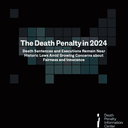A federal District Court judge ruled that Missouri’s proposed changes to its lethal injection process still do not meet the constitutional requirments under the Eighth Amendment. Judge Fernando Gaitan ruled on September 12 that Missouri may use a doctor in good standing to preside over executions rather than requiring a board-certified anesthesiologist, as he first ordered in the case of Michael Taylor. However, other aspects of Missouri’s new protocol still do not sufficiently protect against the risk of a cruel and unusual punishment. Judge Gaitan gave the state until October 27 to submit revised protocols.
(Associated Press, Sept. 12, 2006).
Similar considerations will be reviewed when a District Court judge in California reviews that state’s lethal injection protocol in hearings beginning on September 26. All executions have been on hold in both of these states as the lethal injection procedures are being reviewed. Federal judges in Delaware and Arkansas have also stayed executions in light of lethal injection challenges. In New Jersey, a state appellate court imposed a moratorium on executions while the state pursues a clearer rationale for its lethal injection process. In South Dakota, executions are on hold until the state legislature meets in July 2007 to consider changes to its process.
In Florida, the U.S. Supreme Court unanimously ruled in June that Clarence Hill can bring a challenge to the state’s lethal injection process through a section 1983 civil rights challenge. Nevertheless, the governor signed a death warrant for Hill for September 20. A federal District Court recently rejected Hill’s lethal injection suit without an evidentiary hearing and denied a stay of execution. An appeal to the U.S. Court of Appeals for the 11th Circuit is likely.
(DPIC, various sources, Sept. 13, 2006). See DPIC’s Lethal Injection page and Methods of Execution.



